William Hague quits as foreign secretary in cabinet reshuffle
- Published
Newsnight's Allegra Stratton looks back at William Hague's political career
William Hague has stood down as foreign secretary, but will stay in the cabinet as Leader of the Commons, Downing Street has said.
At least 12 men will leave their posts in the significant reshuffle, including Ken Clarke who is standing down.
Environment Secretary Owen Paterson is leaving the cabinet and is expected to be replaced by education minister Liz Truss.
Philip Hammond has accepted the role of foreign secretary.
Labour described the reshuffle as "the massacre of the moderates".
Mr Hague is to leave Parliament at the 2015 general election after 26 years as MP for Richmond, North Yorkshire.
Senior ministers have told the BBC that the current defence secretary, Philip Hammond, will replace Mr Hague.
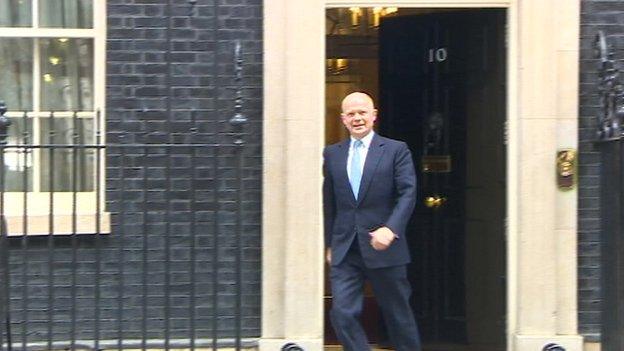
William Hague leaves Downing Street after a brief visit on Tuesday morning
Prime Minister David Cameron said: "William Hague has been one of the leading lights of the Conservative Party for a generation, leading the party and serving in two cabinets.
"Not only has he been a first-class foreign secretary - he has also been a close confidant, a wise counsellor and a great friend.
"He will remain as first secretary of state and my de facto political deputy in the run up to the election - and it is great to know that he will be a core part of the team working to ensure an outright Conservative victory."
Ken Clarke told Radio 4's Today programme that he felt it was "time to step down".
He said: "If you do work beyond the normal retirement age, I think actually you should prepare to decide you're going to go before people are starting to scratch their head and think of reasons to get rid of you."
Speaking on Mr Cameron's latest changes, he said: "He doesn't have many reshuffles which is a very good thing so ministers find out what their job is and then he wants a reshuffle, which looks like the sort of government he wants in the next Parliament.
"That's what he's done and guys like me who have done a few decades in government took the opportunity to retire."
He added it was "superficial" for people to become obsessed with the gender balance of the cabinet and that Mr Cameron had made "enormous efforts" to get women in.

Analysis
Chris Mason, BBC political correspondent
As reshuffles go, this is David Cameron's biggest.
And if you want to know how it looks, you needn't look any further than a tweet , externalfrom Conservative MP Alistair Burt: "I'm really worried that this reshuffle will leave the PM short of middle aged white men in Govt. I'm selflessly ready Dave!"
In other words, there is something of a cull of what critics have called "the male, pale and stale" and what is expected next is the promotion of faces and voices that are seen to better represent contemporary Britain.
So popping up on a telly near you soon: more ministers who are women and more ministers with regional accents, in more prominent roles.

Mr Hague said: "I am delighted to be able to serve as Leader of the House of Commons, and to be able to campaign for Conservative candidates across the country. I want to finish in frontline politics as I began - speaking in Parliament and campaigning among the voters.
"After the general election I will return to my writing, while still giving very active support to the Conservative Party and campaigning on international causes I believe in."
The prime minister is understood to have held a series of meetings in his House of Commons office on Monday with ministers.
BBC political editor Nick Robinson said the current occupant of the Commons leader post, ex-health secretary Andrew Lansley, had left the government.
Environment Secretary Owen Paterson is effectively being fired, our correspondent added.
Other Conservative MPs to have lost or left their ministerial jobs include:
David Jones, ex-Welsh secretary
David Willetts, ex-universities minister
Sir George Young, ex-chief whip
Nick Hurd, ex-minister for civil society
Hugh Robertson, ex-Foreign Office minister
Greg Barker, ex-energy minister
Alan Duncan, ex-international development minister
Andrew Robathan, ex-Northern Ireland minister
Damian Green, ex-policing minister.
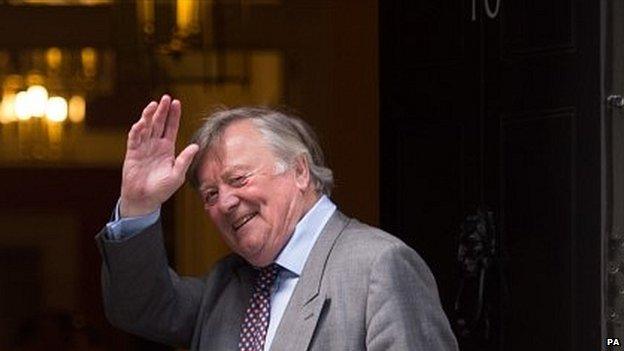
During his 44 years in the Commons, Mr Clarke spent more than 20 years as a minister - latterly as minister without portfolio.
He held a number of top cabinet positions under Margaret Thatcher and John Major, including home secretary and chancellor of the exchequer, and tried and failed three times to become Conservative leader.
In 1997, he lost out to Mr Hague, who went on to lead the party until 2001.
Nick Robinson said Mr Clarke has told friends that at the age of 74 he has had enough of red boxes and "enjoyed three days at last week's Test match in anticipation of today's announcement".
He became justice secretary in 2010 and has held his current role since 2012.
Former Conservative Party leader Lord Howard told BBC Radio 4's PM programme: "It is quite a moment. Ken has made the most extraordinary contribution to our public life. He was an outstanding chancellor of the exchequer."

Analysis
By Nick Robinson, BBC Political Editor
On Monday the losers learnt their fate.
Now we will discover who are the winners in a reshuffle made more dramatic and more wide-ranging by the decision of William Hague to quit the post he has filled for four years.

And former Conservative deputy PM Lord Heseltine told the BBC News Channel: "Ken has been a fantastic servant of this country, and also of the Conservative Party, but there just is a time when you have to face up to it: the generation moves on.
"You won't have heard the last of Ken, believe me."
He was one of the most pro-European voices at the top of the Conservative Party.
Mr Cameron is expected to use the reshuffle to promote more women within ministerial ranks. Downing Street said replacements for the outgoing ministers would be announced on Tuesday.
Labour MP Michael Dugher, the shadow minister for the Cabinet Office, said the reshuffle "speaks volumes about David Cameron's leadership".
On the reports of Mr Hammond taking over as foreign secretary, he added: "Britain's foreign policy is now set to be led by a man who has talked about taking us out of the EU.
"The Tories are now retreating out of Europe with all the threat that poses to jobs and business in Britain."
- Published14 July 2014
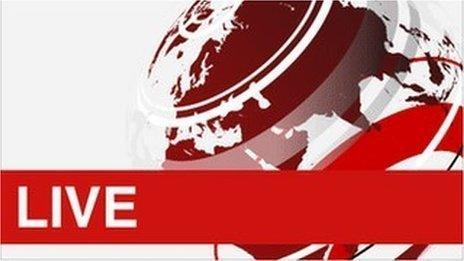
- Published15 July 2014
- Published14 July 2014
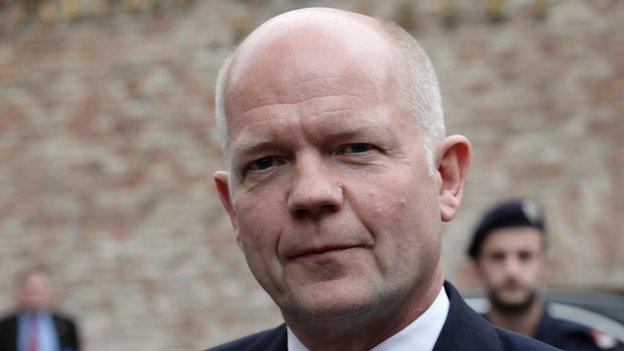
- Published14 July 2014
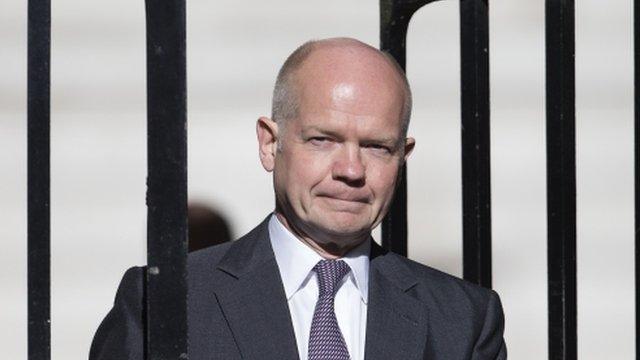
- Published14 July 2014
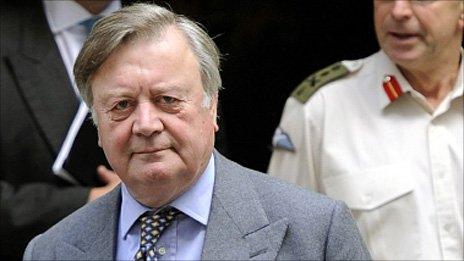
- Published14 July 2014
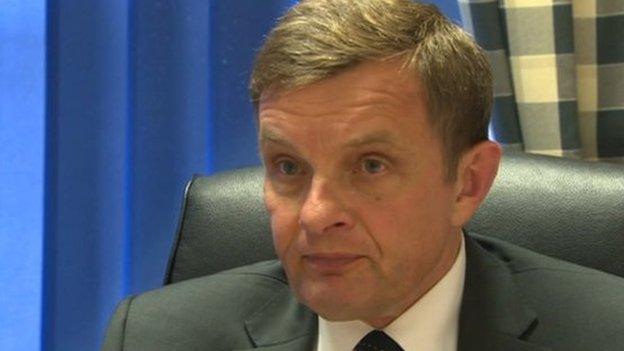
- Published14 July 2014